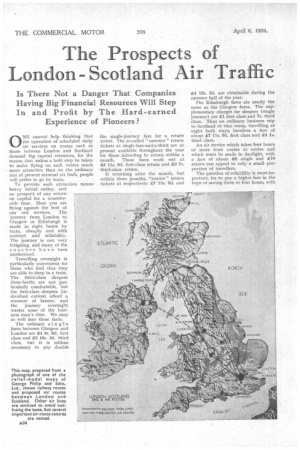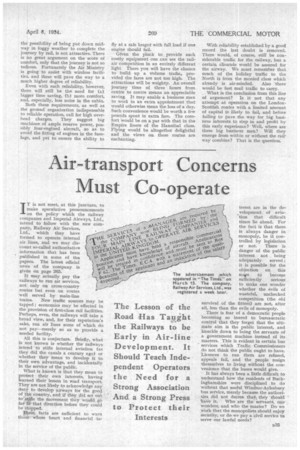The Prospects of London Scotland Air Tra
Page 52

Page 53

If you've noticed an error in this article please click here to report it so we can fix it.
Is There Not a Danger That Companies Having Big Financial Resources Will Step In and Profit by The Hard-earned Experience of Pioneers ?
NE cannot help thinking that the operation of scheduled daily air services on routes such as those between London and Scotland demand big capital resources, for the reason that unless a bold step be taken to make flying on such routes much more attractive than on the ordinary run of present internal air lines, people will prefer to go by train.
To provide such attraction means heavy initial outlay, and no prospect of any return on capital for a considerable time. Here you are flying against the best of our rail services. The journey from London to Glasgow or Edinburgh is made in eight hours by train, cheaply and with comfort and reliability. The journey is not very fatiguing, and many of the coaches have been modernized.
Travelling overnight is particularly convenient for those who find that they are able to sleep in a train. The third-class sleepers (four-berth) are not particularly comfortable, but the first-class sleepers (individual cabins) afford a measure of luxury, and the journey overnight wastes none of the business man's time. We may as well face these facts.
The ordinary single fares between Glasgow and London are £4 3s. 8d. first class and £2 10s. 3d. third class, but it is seldom necessary to pay double the single-journey fare for a return ticket. The so-called " summer " return tickets at single-fare-and-a-third are at present available throughout the year for those intending to return within a month. These fares work out at £5 us. 9d. first-class return and £3 7s. third-class return.
If returning after the month, but within three months, "tourist" return tickets at respectively £7 13s. 9d. and
£4 12s. 3d. are obtainable during the summer half of the year.
The Edinburgh fares are nearly the same as the Glasgow fares. The supplementary charges for sleepers (single journey) are £1 first class and 7s. third class. Thus an ordinary business trip to Scotland or vice versa, travelling at night both ways, involves a fare of about £7 11s. 9d. first class and £4 is. third class.
An air service which takes four hours or more from centre to centre and which must be made in daylight, with a fare of about £6 single and £10 return can appeal to only a small proportion of travellers.
The question of reliability is most important, for to pay a higher fare in the hope of saving three or four hours, with the possibility of being put down midway in foggy weather to complete the journey by rail, is not attractive. There is iao great argument on the score of comfort, only that the journey is not so tedious. Fortunately the Air Ministry is going to assist with wireless facilities, and these will pave the way to a much higher degree of reliability.
Even with such reliability, however, there will still be the need for (a), bigger time saving, (b) more comfort, .and, especially, less noise in the cabin.
Both these requirements, as well as the ground organization indispensable to reliable operation, call for high overhead charges. They suggest big machines of ample reserve power, possibly four-engined aircraft, so as to avoid the fitting of engines in the fuselage, and yet to ensure the ability to fly at a safe heignt with full load if one engine should fail.
'Given the pluck to provide such costly equipment one can see the railair competition in an entirely different light There you will have the chance to build up a Volume traffic, provided the fares are not too high. The attractions will be weighty. An overall journey time of three hours from centre to centre means an appreciable saving. It may enable a business man to worli in an extra appointment that would otherwise mean the loss of a day. Such convenience would be worth a few pounds spent in extra fare. The comfort would be on a par with that in the Empire liners of the Hannibal class. Flying would be altogether delightful and the views on these routes are enchanting. With reliability established by a good record the last doubt is removed. There would, of course, still be considerable traffic for the railway, but a certain clientele would be assured for the airway. We must remember that much of the holiday traffic to the North is from the monied class which already is air-minded. Also 'there would be fast mail traffic to carry.
'What is the conclusion from this line of argument? Is it not that any attempt at operation on the LondonScottish routes with a limited amount of capital is likely to fail, and before failing to pave the way for big business interests to step in and profit by this early experience? Well, where are these big business men? Will they emerge from within or without the railway combine? That is the question.




































































































